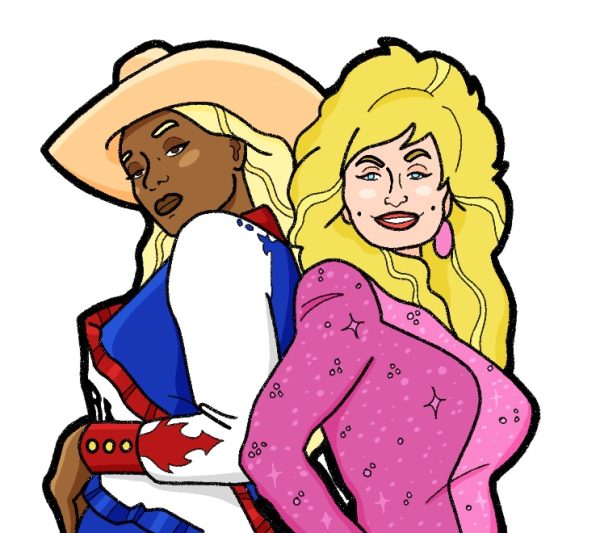
Dolly Parton applauds Beyoncé for cover of “Jolene” amongst mixed reviews. Illustration by Charlie Trumbull | Washtenaw Voice
Lily Cole
Deputy Editor
“Cowboy Carter”
Beyoncé dropped the highly anticipated “Cowboy Carter” album on March 29, and not even two weeks later, she became the first Black woman to reach number one on Billboard’s Top Country Albums chart, making history in the genre.
When I looked at the album and saw “JOLENE” as one of the songs, my fingers hit that play button quicker than you can say “yeehaw.” I mainly did this because I am a self-proclaimed “Jolene” enthusiast (my cat is named Jolene after Dolly Parton’s 1973 song.)
Parton’s inspiration for “Jolene” came from a fan interaction with an eight-year-old girl named Jolene. According to an interview by NRP in 2008, Parton also said to have taken inspiration from another redhead in her life at the time–a bank teller who was giving Parton’s new husband attention.
But, the history behind “Cowboy Carter” is a little muggy. Many assume it is most likely because of a 2016 Country Music Awards (CMAs) performance that resulted in racist backlash. Beyoncé herself has called it “an experience that I had years ago where I did not feel welcomed, and it was very clear that I wasn’t.”
So when she showed up to the 2024 Grammys in head-to-toe cowboy garb, to a lot of people, it was safe to assume what she was alluding to.
Differences and impact
Both songs begin with the same sound–a melancholy guitar signaling what’s about to happen next. But while Parton’s is more plucky, Beyoncé’s sound is smoother, drawing listeners in with a backtrack of a man singing Jolene’s name.
Her “JOLENE” differs from Parton’s in a refreshing way. It combines the unique sounds of country and R&B with beautiful vocals. Both singers use harmony to convey their point, but while Parton uses her own voice, Beyoncé uses many others like men and women to have her idea shines through. Beyoncé’s lyrics empower women to stand up for themselves.
Online, there’s been a lot of backlash against the rewritten lyrics and Beyoncé’s interpretation of the classic song.
The backlash has been prominent on Twitter (X) specifically. User AyoCeaser writes, “I’m not sure that Jolene works when you take the pain out of it. If you’re not threatened by her, why are you plaintively singing her name repeatedly?”
But that’s the thing: she must be threatened by Jolene, or why would she sing about her?
The rewritten lyrics take Parton’s heartbreaking plea, add Beyoncé’s personal spin and help us think about changing how women are perceived to act today.
That’s why the lyrics are powerful and by changing the narrative of the original song’s meaning, Beyoncé enables a way to combat this ever-present problem within women.
“Cowboy Carter” isn’t just an album that integrates Beyoncé into country music’s spotlight. It’s an album that discusses the culture of America in a way that redefines stereotypes and explores race, co-cultures and power, all with a catchy tune that incorporates different genres.
Beyoncé is a pioneer in her career–reinforcing the fact that she defies the unimaginable within the music industry. Even Parton praises Beyoncé for her interpretation.
“Wow, I just heard Jolene,” she said via Instagram . “Beyoncé is giving that girl some trouble and she deserves it! Love, Dolly P.”
So I say thank you, Dolly and Beyoncé. We’ll all love Jolene, even if she tried to steal a man.
Dolly also has an interlude leading into the song on the album!


